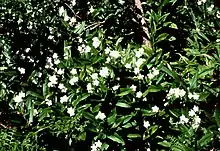Dasynotus
Dasynotus is a monotypic genus of flowering plants belonging to the family Boraginaceae, it only contains one known species, Dasynotus daubenmirei I.M.Johnst..[1]
| Dasynotus | |
|---|---|
 | |
| Dasynotus daubenmirei, Clearwater National Forest, USA | |
| Scientific classification | |
| Kingdom: | Plantae |
| Clade: | Tracheophytes |
| Clade: | Angiosperms |
| Clade: | Eudicots |
| Clade: | Asterids |
| Order: | Boraginales |
| Family: | Boraginaceae |
| Genus: | Dasynotus I.M.Johnst. |
Its native range is north-western USA and it is only found in Idaho.[1]
The genus and species were circumscribed by Ivan Murray Johnston in J. Arnold Arbor. vol.29 on page 233 in 1948.[1]
It has the common name of 'Daubenmire's Dasynotus'.[2]
The Latin specific epithet of daubenmirei is in honour of Rexford F. Daubenmire (1909—1995),[3] an American ecologist that went to the University of Minnesota, where he was taught by William Skinner Cooper (1884–1978), among his fellow students at Minnesota were Henry J. Oosting, Murray Fife Buell and Frank Edwin Egler.[4]
Dasynotus has a unique morphology, when compared to other species of the Boraginaceae family, as it has large white salverform (composed of united petals forming a tube that spreads at the open end) corollas with long horn-like faucal appendages and large nutlets covered with sparse trichomes (hairs).[5]
References
- "Dasynotus I.M.Johnst. | Plants of the World Online | Kew Science". Plants of the World Online. Retrieved 21 March 2021.
- "Daubenmire's Dasynotus (Dasynotus daubenmirei) | Idaho Fish and Game". idfg.idaho.gov. Retrieved 25 June 2022.
- Caicco, Steven L. (December 1989). "FIELD INVESTIGATIONS OF SELECTED SENSITIVE PLANT SPECIES ON THE NEZ PERCE NATIONAL FOREST" (PDF). Idaho Department of Fish and Game. Retrieved 25 June 2022.
- "wards EMINENT ECOLOGIST FOR 1979" (PDF). Retrieved 25 June 2022.
- Cohen, James I. (April 2014). "A phylogenetic analysis of morphological and molecular characters of Boraginaceae: evolutionary relationships, taxonomy, and patterns of character evolution". Cladistics. 30 (2): 139–169.